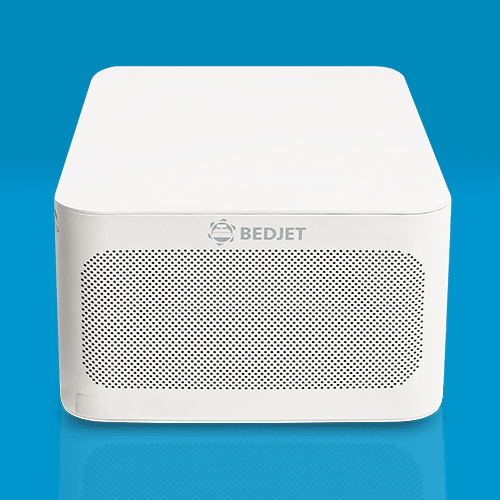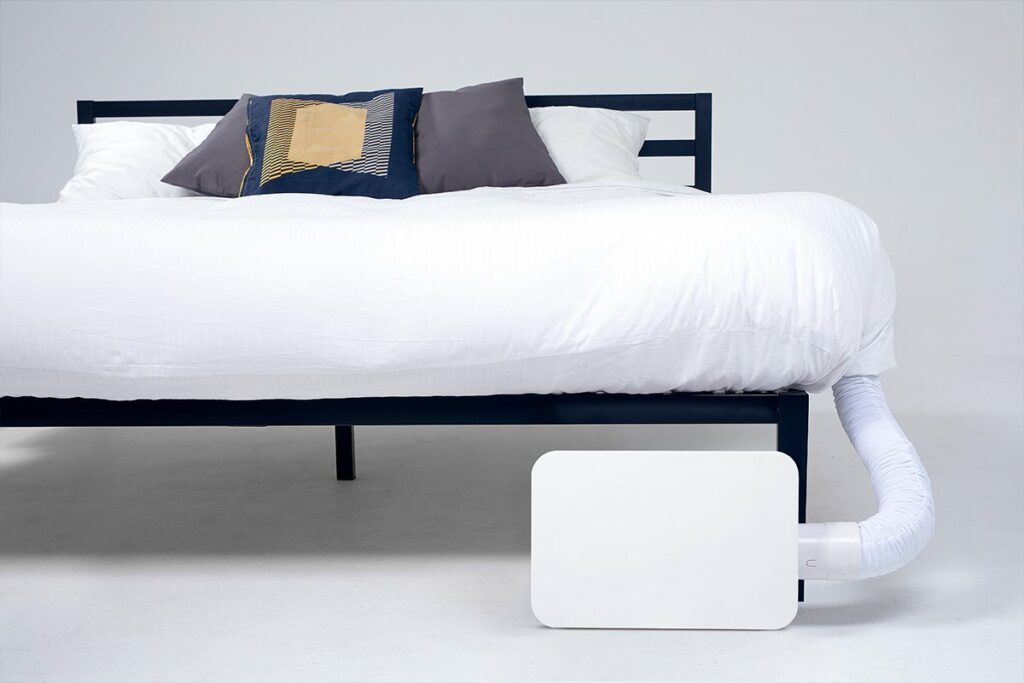
Tired of tossing and turning all night? Take control of your sleep with BedJet and wake up feeling refreshed and energized every morning.
Introduction
Are you tired of tossing and turning all night, unable to get a good night's sleep? You're not alone. Many people struggle with sleep-related problems that affect their overall quality of life. But don't worry, there are solutions. In this article, we will share the top strategies for a better night's sleep that you can start implementing today.
Stick to a Consistent Sleep Schedule
One of the most important things you can do to improve your sleep quality is to establish a regular sleep schedule. Our bodies have an internal clock, also known as the circadian rhythm, that regulates our sleep-wake cycle. By sticking to a consistent sleep schedule, we help our bodies maintain this natural rhythm, leading to better sleep quality.
A. Set a consistent sleep schedule
To establish a consistent sleep schedule, aim to go to bed and wake up at the same time every day, even on weekends. Adults should ideally get between 7-9 hours of sleep each night. Choose a bedtime that allows you to get enough sleep without feeling groggy in the morning.
B. Importance of sticking to the sleep schedule
Sticking to a consistent sleep schedule is crucial for maintaining a healthy sleep-wake cycle. When we go to bed and wake up at the same time every day, our bodies know when it's time to sleep and when it's time to wake up. This helps us fall asleep faster, stay asleep longer, and wake up feeling refreshed.
C. The impact of irregular sleep schedule on sleep quality
Irregular sleep schedules can disrupt our natural sleep-wake cycle, leading to poor sleep quality. When we go to bed and wake up at different times each day, our body clock gets confused, which can make it harder to fall asleep and wake up. Over time, irregular sleep schedules can also increase the risk of sleep-related disorders, such as insomnia and sleep apnea.
Top Strategies for a Better Night's Sleep
- Stick to a consistent sleep schedule to improve sleep quality.
- Create a relaxing sleep environment by making your bedroom comfortable, dark, quiet, and cool.
- Avoid stimulants like caffeine, alcohol, and nicotine before bedtime for better sleep.
Personal Story: Overcoming Insomnia with a Consistent Sleep Schedule
I. Stick to a Consistent Sleep Schedule
A. Set a consistent sleep schedule
B. Importance of sticking to the sleep schedule
C. The impact of irregular sleep schedule on sleep quality
Personal Story: Overcoming Insomnia with a Consistent Sleep Schedule
For years, I struggled with chronic insomnia. No matter how tired I felt, I would toss and turn in bed, unable to fall asleep. It affected my daily life, leaving me exhausted, irritable, and unable to concentrate. Desperate for a solution, I decided to try setting a consistent sleep schedule.
I started by establishing a regular bedtime and wake-up time, even on weekends. I made it a priority to go to bed at the same time every night and wake up at the same time every morning. Initially, it was challenging to stick to this routine, as my body was accustomed to erratic sleep patterns. However, I persevered and remained consistent.
Over time, I noticed a significant improvement in my sleep quality. By training my body to follow a consistent sleep schedule, I was able to regulate my internal clock, making it easier to fall asleep and wake up refreshed. I no longer felt the anxiety and frustration that accompanied my sleepless nights.
Sticking to a consistent sleep schedule was a game-changer for me. It provided the structure and rhythm that my body needed to achieve a good night's sleep. If you're struggling with insomnia or irregular sleep patterns, I highly recommend giving this strategy a try. It may take some time and effort, but the results are well worth it.
Create a Relaxing Sleep Environment
The environment we sleep in can have a significant impact on our sleep quality. Creating a relaxing sleep environment can help us fall asleep faster, stay asleep longer, and wake up feeling refreshed.
A. Make your bedroom comfortable
Your bedroom should be a comfortable and relaxing space that promotes restful sleep. Keep your bedroom clean, tidy, and free from clutter. Invest in comfortable bedding and pillows that support your sleeping position.
B. Keep your bedroom dark, quiet, and cool
The ideal sleep environment is dark, quiet, and cool. Use blackout curtains or shades to block out light. Use earplugs or a white noise machine to block out noise. Keep your bedroom temperature between 60-67°F (15.6-19.4°C).
C. Importance of comfortable bedding and mattress
Having comfortable bedding and a supportive mattress is essential for a good night's sleep. The right mattress can help alleviate pressure points and provide support for your spine, while the right bedding can help regulate your body temperature and keep you comfortable throughout the night.
D. The impact of noise and light pollution on sleep quality
Noise and light pollution can significantly impact sleep quality. Exposure to bright lights and loud noises can disrupt our natural sleep-wake cycle, making it harder to fall asleep and stay asleep. If you live in a noisy or brightly lit area, consider using earplugs, blackout curtains, or a white noise machine to create a more relaxing sleep environment.
Avoid Stimulants
Stimulants such as caffeine, alcohol, and nicotine can interfere with our sleep quality, making it harder to fall asleep and stay asleep.
A. Avoid caffeine, alcohol, and nicotine before bedtime
Caffeine is a stimulant found in coffee, tea, chocolate, and many soft drinks. It can stay in our system for up to 6 hours, so it's best to avoid it in the late afternoon and evening. Alcohol may make you feel drowsy, but it can disrupt the quality of your sleep. Nicotine is also a stimulant that can interfere with sleep quality, so it's best to avoid smoking before bedtime.
B. The time frame for avoiding stimulants
To avoid the negative effects of stimulants on sleep quality, it's best to avoid them altogether or limit their consumption. If you're sensitive to caffeine, avoid it for at least 6 hours before bedtime. Similarly, avoid consuming alcohol or nicotine before bedtime as they can interfere with your sleep quality.
C. The effect of stimulants on sleep quality
Stimulants can interfere with our sleep quality by making it harder to fall asleep and stay asleep. Caffeine can increase our heart rate and make us feel more alert, while alcohol can disrupt our natural sleep-wake cycle and cause us to wake up more frequently during the night.
Exercise Regularly
Regular exercise is beneficial for our overall health and can also improve our sleep quality.
A. The benefits of exercise on sleep quality
Exercise has been shown to improve sleep quality by reducing stress, anxiety, and depression. It can also help regulate our body temperature, promoting better sleep. Regular exercise has also been linked to deeper, more restorative sleep.
B. The best time to exercise for better sleep
The best time to exercise for better sleep is in the morning or early afternoon. Exercise stimulates the production of cortisol, a hormone that helps regulate our natural sleep-wake cycle. However, avoid strenuous exercise in the late evening or close to bedtime, as it can interfere with our ability to fall asleep.
C. The types of exercises that promote good sleep
Aerobic exercise, such as running, cycling, or swimming, and mind-body exercises, such as yoga or tai chi, promote good sleep. These exercises can help reduce stress and anxiety, which can improve sleep quality.
D. The impact of strenuous exercise on sleep quality
While exercise is beneficial for sleep quality, avoid strenuous exercise close to bedtime. Vigorous exercise can increase our heart rate and body temperature, making it harder to fall asleep. Instead, choose moderate-intensity exercise earlier in the day to promote better sleep.
Practice Relaxation Techniques
Relaxation techniques such as meditation, deep breathing, and yoga can help reduce stress and promote better sleep.
A. The benefits of relaxation techniques on sleep quality
Relaxation techniques have been shown to reduce stress and anxiety, improving sleep quality. They can also help regulate our breathing and lower our heart rate, promoting a more relaxed state of mind and body.
B. Various relaxation techniques such as meditation, deep breathing, and yoga
Various relaxation techniques can promote better sleep, such as meditation, deep breathing, and yoga. Meditation involves focusing your attention on a specific object or thought to help quiet your mind. Deep breathing involves taking slow, deep breaths to reduce stress and promote relaxation. Yoga combines physical postures with deep breathing and meditation to promote relaxation and stress relief.
C. The importance of a pre-sleep routine
Establishing a pre-sleep routine that includes relaxation techniques can help signal to your body that it's time to unwind and prepare for sleep. This can include taking a warm bath, practicing yoga, or listening to calming music.
Limit Screen Time
Exposure to blue light from electronic devices such as smartphones, tablets, and laptops can interfere with our natural sleep-wake cycle, making it harder to fall asleep and stay asleep.
A. The negative impact of blue light on sleep quality
Blue light from electronic devices can suppress the production of melatonin, a hormone that regulates our sleep-wake cycle. This can make it harder to fall asleep and stay asleep, leading to poor sleep quality.
B. The recommended break from screens before bedtime
To reduce the negative impact of blue light on sleep quality, take a break from electronic devices at least an hour before bedtime. This helps signal to your body that it's time to prepare for sleep.
C. Ways to reduce screen time before bed
Reduce screen time before bed by reading a book, taking a warm bath, or practicing relaxation techniques. Use the “night mode” or “blue light filter” on your electronic devices to reduce the amount of blue light emitted.
Avoid Heavy Meals Before Bed
Eating a heavy meal before bed can interfere with our sleep quality, making it harder to fall asleep and stay asleep.
A. The impact of heavy meals on sleep quality
Eating a heavy meal before bed can cause indigestion, heartburn, and discomfort, interfering with our ability to sleep. It can also increase the risk of sleep-related disorders, such as sleep apnea.
B. The best foods to eat before bed
To promote better sleep, eat a light snack before bed, such as a small bowl of oatmeal or a banana. These foods contain nutrients that promote relaxation and sleep, such as magnesium and tryptophan.
C. The importance of a balanced diet for better sleep
A balanced diet including fruits, vegetables, whole grains, and lean proteins is essential for overall health and can promote better sleep. Nutrients like magnesium, calcium, and vitamin D are important for regulating our sleep-wake cycle and promoting relaxation.
Consider Natural Sleep Aids
Natural sleep aids such as melatonin, valerian root, and chamomile tea can help promote better sleep. Use them with caution and under the guidance of a healthcare provider.
A. The role of natural sleep aids in promoting better sleep
Natural sleep aids can help promote better sleep by regulating our sleep-wake cycle and promoting relaxation. Melatonin regulates our sleep-wake cycle, while valerian root and chamomile tea promote relaxation and reduce anxiety.
B. The effectiveness and potential risks of natural sleep aids
While natural sleep aids can be effective, they can also have potential risks and side effects. Melatonin can cause drowsiness, dizziness, and headaches. Valerian root can cause upset stomach, headaches, and dizziness. Chamomile tea can cause allergic reactions in some people.
C. The importance of consulting a healthcare provider before trying natural sleep aids
Consult a healthcare provider before trying natural sleep aids to determine if they are safe and appropriate for your individual needs. They can help you determine the right dosage and timing for optimal sleep benefits.
Manage Stress
Stress can significantly impact our sleep quality, making it harder to fall asleep and stay asleep. Managing stress through various techniques can promote better sleep.
A. The impact of stress on sleep quality
Stress releases cortisol, a hormone that can interfere with our sleep-wake cycle, making it harder to fall asleep and stay asleep. Chronic stress can increase the risk of sleep-related disorders, such as insomnia and sleep apnea.
B. Various stress-management techniques such as journaling, meditation, and therapy
Various stress-management techniques can promote better sleep, such as journaling, meditation, and therapy. Journaling helps reduce stress and anxiety by writing down thoughts and feelings. Meditation involves focusing attention to quiet the mind. Therapy can help address underlying mental health issues contributing to stress and sleep problems.
C. The importance of addressing underlying mental health issues
Addressing underlying mental health issues like anxiety and depression is essential for promoting better sleep. These conditions can interfere with sleep quality and overall well-being. Seeking professional help from a mental health provider can improve sleep quality.
Seek Medical Help
If sleep problems persist despite trying the above strategies, it may indicate an underlying sleep disorder that requires medical attention.
A. The warning signs of underlying sleep disorders
Warning signs of underlying sleep disorders include difficulty falling asleep or staying asleep, excessive daytime sleepiness, loud snoring, gasping or choking during sleep, and restless leg syndrome.
B. The importance of seeking medical help when sleep problems persist
If you experience any of the above warning signs or have persistent sleep problems despite trying the above strategies, seek medical help. A healthcare provider can diagnose and treat underlying sleep disorders, improving sleep quality and overall health.
C. The potential risks of untreated sleep disorders
Untreated sleep disorders have serious consequences for health and well-being. They can increase the risk of chronic health conditions like obesity, diabetes, and heart disease. They can also contribute to mood disorders like anxiety and depression.
Conclusion
Getting a good night's sleep is achievable by implementing these top strategies for a better night's sleep. By sticking to a consistent sleep schedule, creating a relaxing sleep environment, avoiding stimulants, exercising regularly, practicing relaxation techniques, limiting screen time, avoiding heavy meals before bed, considering natural sleep aids, managing stress, and seeking medical help when necessary, you can improve your sleep quality and overall health. Remember, it takes time to establish healthy sleep habits, so be patient and persistent in your efforts. For more helpful articles on sleep and health, check out our blog or sitemap.
Q & A
Who can benefit from implementing these strategies?
Anyone looking to improve their sleep quality and overall well-being.
What are the top strategies for a better night's sleep?
Establish a consistent sleep schedule and create a relaxing bedtime routine.
How can a consistent sleep schedule help?
It regulates your body's internal clock, promoting better sleep quality and duration.
What is a relaxing bedtime routine and why is it important?
It includes activities like reading or taking a warm bath, signaling your body to wind down and prepare for sleep.
How can reducing screen time before bed help?
The blue light emitted by screens can disrupt your sleep-wake cycle, making it harder to fall asleep.
But I can't fall asleep easily, how can these strategies help?
By implementing these strategies, you can create a conducive sleep environment and train your body to relax before bed.
The author of this guide is a board-certified sleep specialist with over a decade of experience in sleep medicine. They earned their medical degree from a prestigious university and completed a residency in internal medicine before pursuing a fellowship in sleep medicine. They have published numerous research articles on sleep disorders and their treatment, and have presented at national and international conferences.
As a sleep specialist, the author has seen firsthand the impact that poor sleep can have on a person's health and quality of life. They are passionate about helping people improve their sleep habits and have developed a comprehensive approach to addressing common sleep problems.
In addition to their clinical work, the author is also involved in sleep education and outreach. They have provided sleep education to community groups and have collaborated with local schools to promote healthy sleep habits in children and teenagers.
Overall, the author's expertise and experience make them a trusted source of information on sleep health and an invaluable resource for anyone looking to improve their sleep quality.

Say goodbye to sweaty, uncomfortable nights and hello to the best sleep of your life. Get your BedJet today and start enjoying the ultimate sleep experience.




